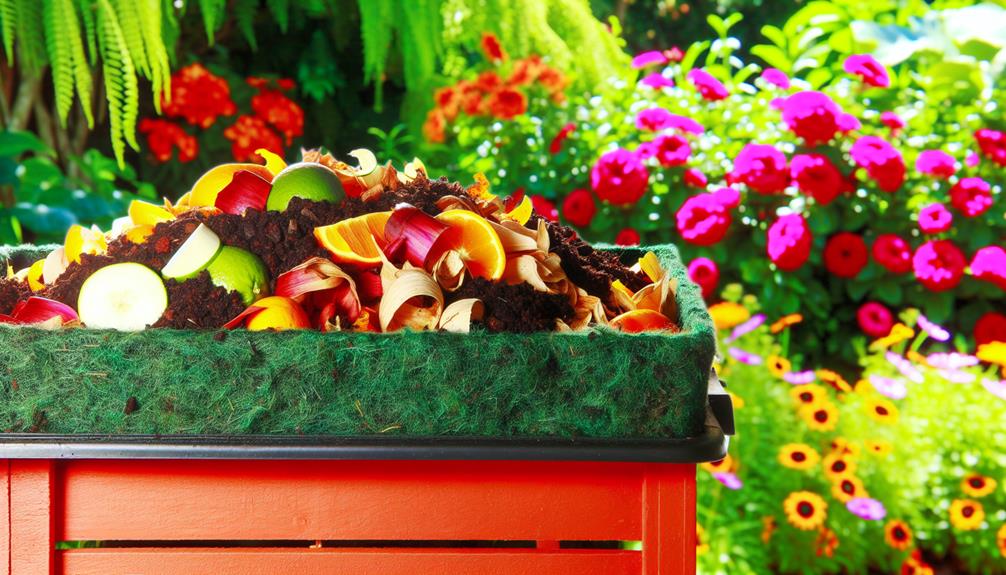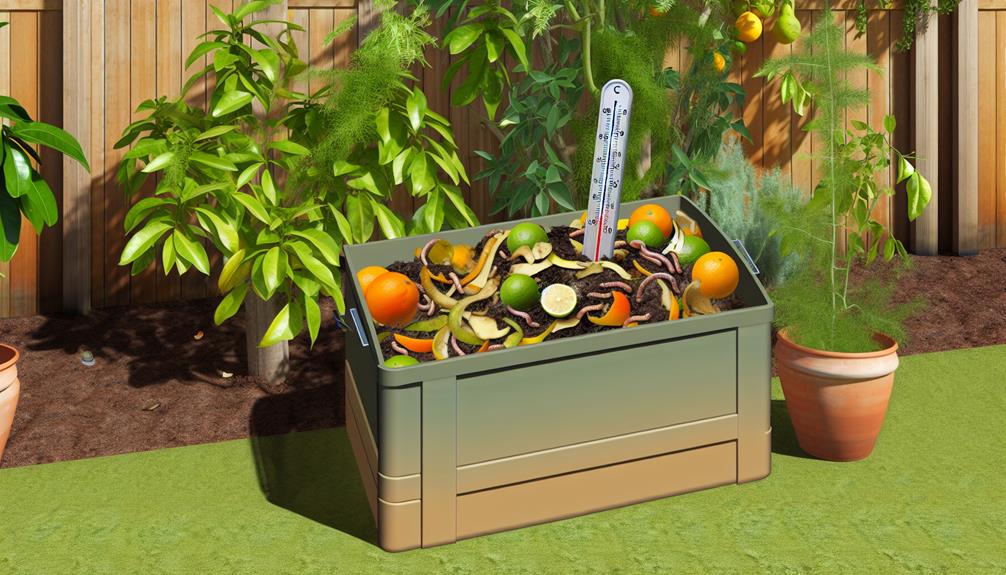

You can compost citrus peels by following a few straightforward steps. Start by chopping them into small pieces to speed up decomposition. Mix these peels with other compost materials to balance acidity. Guarantee adequate aeration by regularly turning the compost pile, which also helps control odors.
Adding brown materials like leaves or cardboard can offset moisture and carbon levels. Citrus peels contribute essential nutrients like nitrogen, phosphorus, and potassium to your compost, enriching your soil. To avoid pest issues, cover fresh citrus peels with more brown materials. These steps will optimize your composting process and benefit your garden. There’s more to explore on this topic.
Contrary to popular belief, you can compost citrus peels without harming your compost pile. Many people worry that citrus peels will increase soil acidity or produce unpleasant odors. However, with the right approach, you can compost these peels effectively and integrate them into your composting routine.
First, you should know that the acidity of citrus peels is neutralized during the composting process. To guarantee this, mix citrus peels with other compost materials like leaves, grass clippings, and kitchen scraps. This balance helps maintain a healthy compost pile and prevents any significant increase in soil acidity.
Odor control is another common concern when composting citrus peels. To manage this, chop the peels into smaller pieces before adding them to your pile. Smaller pieces decompose faster and reduce the likelihood of strong odors. Also, keep your compost pile well-aerated by turning it regularly. This promotes efficient decomposition and mitigates any potential smell.
Incorporating citrus peels into your compost not only helps reduce waste but also enriches your compost with valuable nutrients. Citrus peels are rich in nitrogen, phosphorus, and potassium, which are essential for plant growth. By adding them to your compost, you’re ensuring a well-balanced nutrient content that will help your garden thrive.
Here are three key benefits of adding citrus peels to your compost:
Including citrus peels in your composting routine fosters a sense of community and shared responsibility for the environment. By making this small change, you’re contributing to a sustainable practice that benefits both your garden and the planet.
Also Read: Can You Compost Celery?
To prepare citrus peels for composting, start by thoroughly washing them to guarantee the removal of any pesticides or residues. This step guarantees that your compost remains clean and free from harmful chemicals. Once washed, you can decide whether to use the peels immediately or store them for later use.

For peel storage, keep them in an airtight container in the refrigerator if you plan to use them within a week. If you need to store them longer, consider drying the peels. Peel drying is a simple process: spread the peels in a single layer on a baking sheet and place them in an oven set to the lowest temperature. Alternatively, you can use a dehydrator. Drying the peels helps prevent mold and makes them easier to break down once added to your compost.
Before adding to the compost, you might want to cut the peels into smaller pieces. This increases the surface area and accelerates the decomposition process. Remember, your preparation efforts guarantee that the citrus peels integrate smoothly into your compost system.
Also Read: Can You Compost Cedar Chips?
When adding citrus peels to your compost, make sure you balance them with plenty of brown materials like dry leaves or cardboard to maintain a healthy composting process.
Citrus peels are considered ‘greens,’ meaning they’re high in nitrogen. To guarantee effective composting, you need to mix them with ‘browns,’ which are rich in carbon.
Here’s how to integrate citrus peels into your compost effectively:
Also Read: Can You Compost Ash From Wood?
Don’t be surprised if your compost pile faces a few challenges when you start adding citrus peels. One common issue is compost acidity. Citrus peels can increase the acidity of your compost, which might slow down the decomposition process.
To balance this, add neutralizing materials like crushed eggshells or garden lime. These substances help maintain a healthy pH level, ensuring your compost remains active and effective.

Another potential problem is pest deterrence. Citrus peels can attract fruit flies and other pests if not properly managed. To avoid this, chop the peels into smaller pieces and mix them thoroughly with other compost materials. This not only speeds up decomposition but also makes the citrus less attractive to pests.
Additionally, you can cover fresh citrus additions with a layer of brown materials, such as dried leaves or newspaper, to further deter unwanted visitors.
If you notice your compost pile becoming too wet or slimy, it might be due to the high moisture content in citrus peels. Counteract this by adding more dry, carbon-rich materials like straw or shredded cardboard. This will help balance the moisture levels and keep your compost pile healthy.
Yes, citrus peels can attract pests when composted, but you can practice pest prevention by mixing them well into your compost. They’re also natural repellents for ants and some insects, promoting a healthier compost community.
You’re wondering about the decomposition time for citrus peels. Typically, they take six months to a year to break down. Speed up the breakdown process by chopping them up and mixing them well into your compost.
You’ll find that some plants, like tomatoes and peppers, get a real nutrient boost from composted citrus peels. They enrich the soil with essential nutrients, making your garden thrive and connecting you with fellow green-thumb enthusiasts.
Yes, citrus peels can affect the pH levels of compost. You should practice acidity management to maintain balanced soil composition, ensuring your garden thrives. Including diverse compost materials helps you cultivate a vibrant, welcoming garden community.
Yes, it’s safe to compost citrus peels from non-organic fruits. Just be mindful of potential chemical residues. You can balance this by using diverse compost additives, ensuring a healthy mix. Everyone’s compost can thrive together!
To wrap up, composting citrus peels is both feasible and beneficial. Debunk myths by understanding their acidity won’t harm your compost.
Prepare peels by chopping them into smaller pieces to speed up decomposition. Add them sparingly to balance your compost mix, and monitor for any issues like mold or pests.
By following these steps, you’ll enrich your compost with valuable nutrients from citrus peels, promoting a healthier garden. Happy composting!
